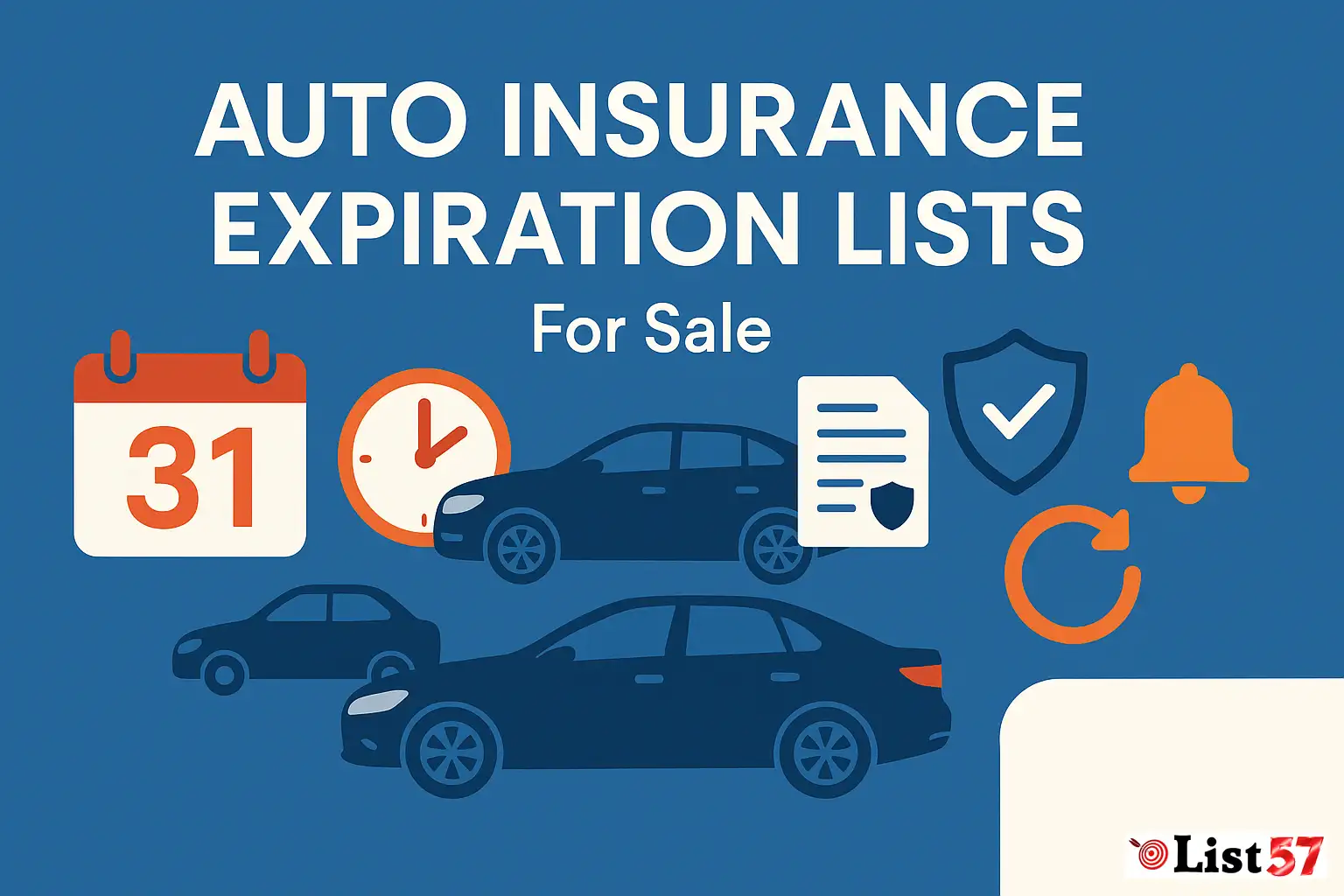
Auto Insurance Expiration Lists
Auto insurance expiration lists with verified renewal windows and contact data to drive quotes, binds, cross-sell, and retention.
Auto insurance expiration lists surface policyholders nearing renewal so you can present competitive quotes, improve retention, and grow premium efficiently. Each record combines verified contact details with renewal timing, with optional vehicle and household indicators for better targeting.
What Are Auto Insurance Expiration Lists
These renewal datasets identify consumers whose auto policies are due within specific windows such as 90, 60, 30, or 14 days. By prioritizing these windows, agencies and carriers can schedule outreach cadence, align payment scenarios, and avoid lapses.
Benefits and Use Cases
Higher Quote Volume
Fill pipelines with renewal-ready prospects who are actively evaluating options.
Improved Retention
Protect book value with proactive renewal contact and loyalty incentives.
Efficient Conquest
Reach competitors’ policyholders as renewal approaches for savings comparisons.
Cross-Sell Growth
Bundle home, renters, roadside, and umbrella products to raise LTV.
Omnichannel Ready
Deploy email, compliant calling, direct mail, and digital retargeting.
Better Forecasting
Use renewal windows to predict quote and bind volume by period.
Key Data Points Included
- Contact: Full name, mailing address, phone, and email
- Renewal Window: Estimated days to expiration and window bands
- Vehicle Indicators: Make, model, year when available
- Household Signals: Multi-vehicle, teen driver, homeowners when provided
- Geography: State, city, ZIP, and radius targeting
- Engagement Flags: Email and phone readiness when available
How to Use Auto Insurance Expiration Lists Effectively
Align Cadence to Renewal Window
Start 60 to 90 days before expiration, then follow at 45, 30, and 14 days to increase quotes and binds.
Personalize Quotes
Reference vehicle and household context with clear coverage comparisons and savings scenarios.
Orchestrate Omnichannel
Coordinate email, mailers, compliant calls, and remarketing audiences for consistent frequency.
Promote Bundles and Loyalty
Use multi-policy discounts and safe driver benefits to lift retention and premium per policy.
Measure and Improve
Track quotes, binds, premium, and save rates. Test offers, subject lines, and cadence.
Maintain Compliance
Follow TCPA, CAN-SPAM, state privacy requirements, carrier guidelines, and internal do-not-contact processes.
Segmentation Ideas
By Renewal Window
90 to 61 days, 60 to 31 days, 30 days or less, or grace period segments.
By Household Profile
Multi-vehicle, teen driver households, homeowners, renters, or commuters.
By Vehicle Class
Luxury, mainstream, SUV and truck, EV and hybrid segments.
By Geography
Radius around offices, ZIP clusters, DMAs, or regions.
Pricing and Delivery Options
List Rental
Campaign-based access with defined usage terms; useful for conquest and seasonal efforts.
List Purchase
Best for ongoing programs that benefit from iterative optimization and reuse.
Custom Filters
Select renewal bands, geography, household signals, vehicle indicators, and suppression rules.
Subscriptions
Monthly or quarterly refreshes to maintain a steady pipeline of expiring policies.
Frequently Asked Questions
How far ahead of expiration targeting runs
Common windows are 90, 60, 30, and 14 days before the estimated renewal date, with cadence increasing as the date approaches.
Whether lists can be filtered by household or vehicle
Yes. Apply filters for multi-vehicle households, teen drivers, homeowners, and available vehicle indicators.
Which delivery formats are available
CSV and spreadsheet formats are standard, with CRM and marketing automation exports available.
Whether the data is compliant
Data originates from lawful sources. Outreach must comply with TCPA, CAN-SPAM, and state privacy rules, plus carrier and internal policies.
What delivery timelines apply
Typical delivery occurs within one to two business days. Complex custom filters may add time.
Whether samples are provided
Sample records are available for structure and quality review aligned to your targeting criteria.
Getting Started
- Define your renewal window: Choose 90, 60, 30, or 14 day bands.
- Select filters: Geography, household signals, and vehicle indicators.
- Pick fields: Contact and renewal timing details for personalization.
- Choose format: CSV or platform-ready export for your CRM or MAP.
- Request a sample: Validate structure, deliverability, and match quality.
- Launch and measure: Track quotes, binds, premium, and save rates.
Get Auto Insurance Expiration Lists
Reach policyholders nearing renewal with verified data and compliant delivery. Increase quotes, binds, and retention.
Request Pricing and Samples